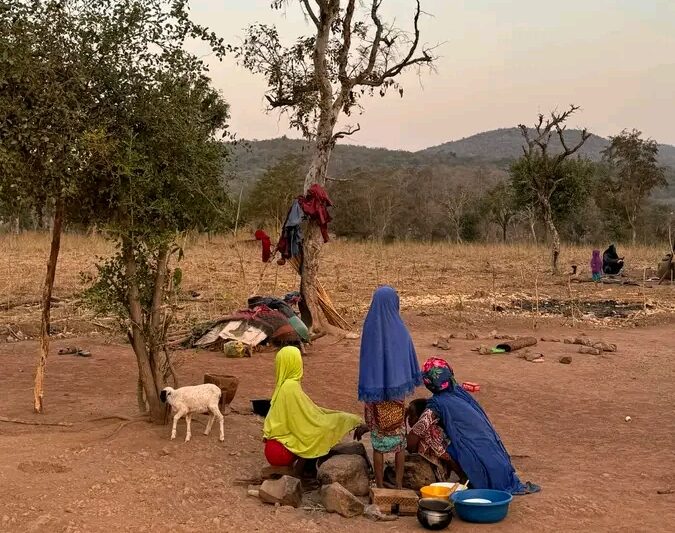United Nations launches plan to secure US$306 million to tackle high levels of food insecurity among 2.8 million people in Nigeria’s northeast, who are ‘just a step away from catastrophic levels of hunger’.
The United Nations Office for the Coordination of Humanitarian Affairs (OCHA) has warned that 230,000 children under the age of five in northeastern Nigeria are at risk of dying due to severe hunger, saying it is a “race against time” to save them.
The survival of these children hangs in the balance during the lean months of May to September in Borno, Adamawa and Yobe (BAY) states.
Urgent treatment for acute malnutrition and other nutritional interventions are crucial.
They also need access to clean water, healthcare and hygienic living conditions to protect them from diseases, such as diarrhoea, which could increase the risk of death.
Mohamed Malick Fall, the UN resident and humanitarian coordinator in Nigeria, issued the warning at the launch of OCHA’s lean season food security and nutrition multisectoral plan, hosted at UN House in Abuja, Nigeria’s capital, on Tuesday, May 14.
Every year, countries in the Sahel face a difficult “lean season” period between planting and harvesting. During this time, food supplies are low, pasture for livestock is scarce and households rely on various coping strategies – often negative – to meet their food needs.
In the BAY states, an estimated 4.8 million people will face severe food insecurity, the highest levels in six years, according to the government-led Cadre Harmonisé analysis released in March this year.
“Low harvests from 2023 due to the dry spell, as well as high food prices and persistent insecurity, are among the main drivers of the food insecurity,” it said.
“Close to half a million people are facing high levels of food insecurity, just a step away from catastrophic levels of hunger,” Fall said.
“Children and vulnerable people, such as pregnant and lactating women, people living with disabilities and the elderly, are especially at elevated risk of acute malnutrition.”
He said the food insecurity and malnutrition crisis was the result of protracted conflict and insecurity in the BAY states, which had disrupted livelihoods and prevented farmers from growing the food they needed to feed their families and to sell in markets.
Drought in parts of Adamawa and Yobe states had led to less food being available.
Rising inflation, particularly for food and fuel, had compounded the crisis, pricing basic food commodities out of the reach of the most vulnerable people.
“To address this alarming crisis, the humanitarian country team in Nigeria, in support of government efforts, has developed a six-month multisectoral lean season plan to mobilise critical funding and resources for not only immediate food assistance and emergency healthcare but also interventions in agricultural livelihoods, water, sanitation, and hygiene and protection.”
Fall said the government, national and international partners needed US$306 million to fast-track food assistance, nutrition supplies and services, clean water, healthcare and protection support to people in severe need.
The plan would target 2.8 million people for urgent interventions.
“Malnutrition rates are of great concern. Approximately 700,000 children under five are projected to be acutely malnourished in the next six months, including 230,000 who are expected to be severely acutely malnourished and at risk of death if they do not receive timely treatment and nutrition support.”
Zubaida Umar, the director-general of the National Emergency Management Agency (NEMA), said at the launch: “The mobilisation of funding and resources to address this lean season food security and nutrition crisis envisaged in the northeast is a step in the right direction in complementing the federal government’s efforts to prevent the deaths of people as a result of malnutrition-related complications, adoption of negative coping mechanisms and other health-related issues.”
Rownak Khan, the acting representative of the UN Children’s Fund in Nigeria, said: “UNICEF is deeply concerned about the escalating food security and nutrition crisis in the BAY states. The alarming rise in severe acute malnutrition among children underscores the urgent need for immediate action. This year alone, we have seen around 120,000 admissions for the treatment of severe acute malnutrition with complications, far exceeding our estimated 90,000. We must ensure that lifesaving nutrition commodities reach every child in need. This is not just a call to action; it is a race against time to save lives and protect the future of millions of vulnerable children.”
Fall said the potential cost of inaction underscored the urgency of the plan.
“If we do not act, not only could thousands of children under five die but there will also be increased population displacement as people move in search of food.
“There will be a profound deterioration in the living conditions of millions of people. Emergency food assistance will be scaled down pushing more people into deprivation. Half of the nutrition centres in the BAY states might be forced to halt operations.
“Desperation will drive more people beyond the safety of garrison towns heightening the risks of abductions, kidnappings, killings, sexual and gender-based violence, or exposure to landmines or unexploded ordnances.
“Affected communities will continue to adopt negative coping mechanisms, including survival sex, begging in the streets, child labour, forced and early marriage. These are but a few of the grim but avoidable repercussions if we do not act.”
Babatunde Ojei, the Nigerian country director of the International Rescue Committee, said that with the lean season coinciding with the rainy season, there was a need for collective efforts to improve access to drinking water, sanitation facilities and hygiene to combat the spread of infectious diseases.
There was expected to be an increase in the number of cases of acute watery diarrhoea – particularly among children – cholera and malaria, he said.
SHETTIMA LAWAN MONGUNO








